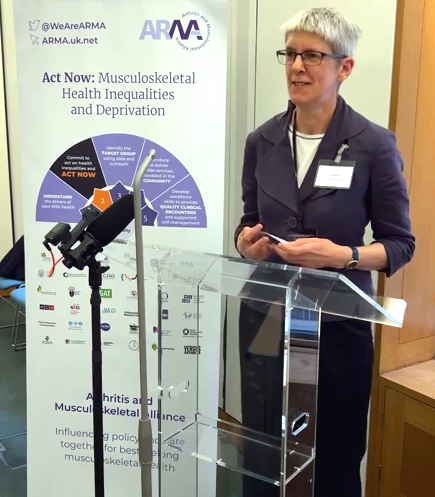 by Sue Brown, CEO ARMA
by Sue Brown, CEO ARMA
It is hard to overstate what a privilege it was to join so many of those who contributed to the Act Now report in Westminster last week. The report exemplifies the ARMA approach of doing things together which none of us could do alone. The energy in the room and the commitment to making a difference was amazing. I feel that MSK is demonstrating what NHS England’s Core20+5 approach looks like in practice.
Our recent FOI requests to ICBs have elicited some responses along the lines of MSK isn’t one of the Core20+5 conditions so we aren’t prioritising it. I think this is a misunderstanding of the approach. All services should be taking a Core20+ approach to health inequalities. Which means that MSK should be targeting the 20% most deprived communities plus other groups experiencing exclusion relevant to their population. The 5 steps to tackling health inequalities in the Act Now report should help anyone not sure where to start in relation to MSK.
There is a lot that MSK services can do but they need a bit of support and recognition from the wider system. I would encourage ICB inequalities leads to find out what’s happening in local MSK services and where there is good work, give it a bit of recognition and profile at Board level.
ICBs should be thinking about this because MSK is the leading cause of years lived with disability, is far more prevalent in deprived areas where it also has a bigger impact on quality of life. But if that’s not enough, ignoring this need also has a system wide impact. The Kings Fund has found that people in the most deprived areas make far greater use of A&E and 999 when they can’t get a GP appointment than in other areas. We know from our inquiry that many people use A&E for their MSK conditions because accessing community services is too difficult. Support your MSK services to find creative solutions and this will have an impact on A&E.
But most of all, support them because this additional burden of MSK in deprived areas is preventable.
